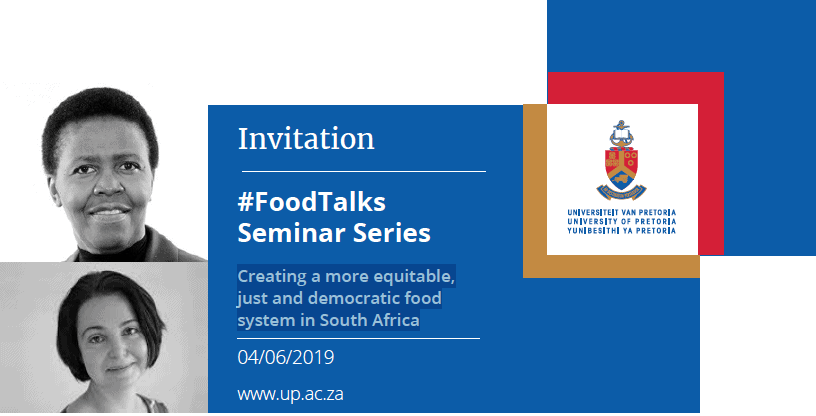Time: 13h30 - 15h00
Venue: Old College House Seminar Lounge 1-09, University of Pretoria
#FoodTalks Seminar Series
13h30 – 15h00, 4 June 2019, Old College House Seminar Lounge 1-09, University of Pretoria
The Centre for the Advancement of Scholarship (CAS) invites you to a #foodtalks seminar on Creating a more equitable, just and democratic food system, with Dr Tracy Ledger (PARI) and Dr Lindiwe Sibanda (CAS). This seminar is organised in collaboration with the DST-NRF Centre of Excellence in Food Security, the Centre for the Study of Governance Innovation (GovInn), and the Human Economy Programme within CAS.
Dr Tracy Ledger will focus her presentation on power in the current SA food system. How could it be democratised? Dr Sibanda will look at learning from the rest of Africa for the creation of a more just and inclusive food system in SA. We will seek answers and solutions to challenging questions, such as, why are food prices so high that millions of South African families go hungry, while prices paid to farmers are so low that many cannot stay in business and farm workers are paid so little they cannot properly feed their families? Why are 1 in 4 South African children stunted due to undernourishment, while corporate profits in the food sector keep rising?
Dr Tracy Ledger has been working as an independent researcher for the past 12 years, with a history as an economist in banking, stockbroking and asset management, and independent research. Her particular areas of interest are alternative food networks, food security and local economic development. She is the author of An Empty Plate: Why we are losing the battle for our food system, why it matters, and how we can win it back. The book analyses the state of the South African agri-food system, and how this system perpetuates poverty, threatens land reform, entrenches inequality and is tearing apart our social fabric.
Dr Lindiwe Sibanda is a Visiting Research Fellow at the Centre for the Advancement of Scholarship, University of Pretoria, and part of the Zimbabwean President›s Advisory Committee. She is the former CEO of the Food, Agriculture and Natural Resources
Policy Analysis Network (FANRPAN), and former Vice-President for Country Support, Policy, and Delivery at the Alliance for a Green Revolution in Africa (AGRA) and has 25 years of trans-disciplinary experience in agriculture and rural development, public and private sector reforms and management. She has also served in a variety of roles with other agricultural institutions critical to the continent’s development, including as Board Chair at the International Livestock Research Institute, a trustee for three agricultural research centres, and as adviser to and advocate for numerous international food and nutrition security-related initiatives.
Food talks to us at many levels, touching on important aspects of our lives and society. This is the first in a series of seminars that will bring together leading thinkers and practitioners in the sector to share knowledge, and create a space to talk about the current food system and how we can move to a socially and ecologically regenerative, just and nourishing food system in South Africa and the region.
RSVP: Cecelia Samson on cecelia.samson@up.ac.za or 012 420 2653
Upcoming Events
Our GOALS
We recognise that producers, processors, distributors and consumers are incorporated into the food system under varying terms and returns. We also recognise the economic, social, human and environmental health impacts associated with food security. Therefore our goal is to conduct research, build capacity and disseminate findings that will promote a sustainable food system in South Africa.
Our MISSION
Our research is concerned with the scale, nature, causes and consequences of food insecurity in South Africa and elsewhere on the African continent. Thus our mission is to investigate products, technologies, processes and policies that can reduce food insecurity and mitigate its negative outcomes. We seek to make a difference to food security by linking innovative science with critical enquiry.




